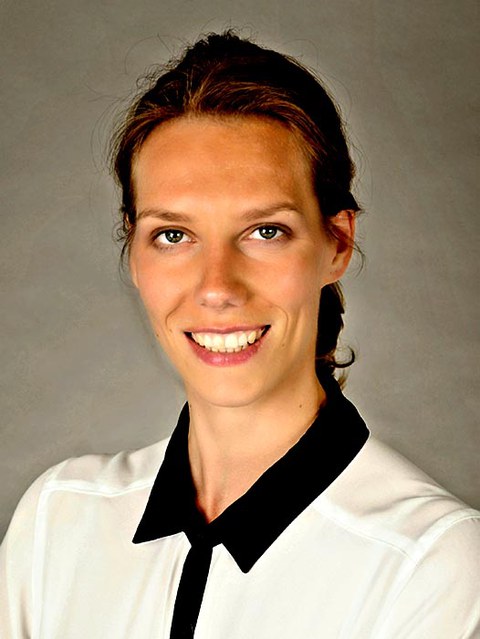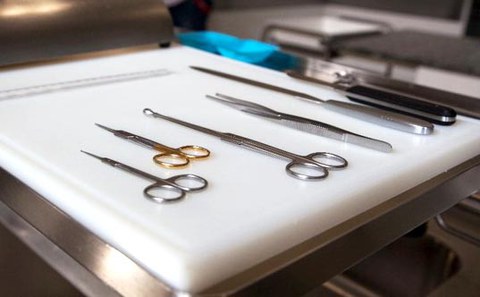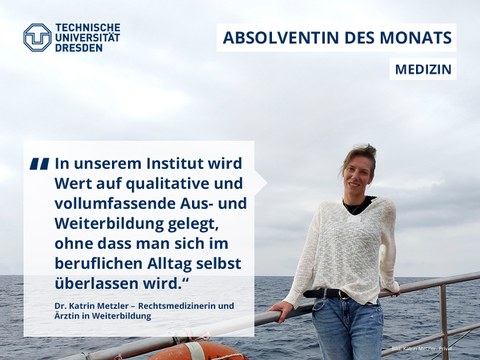Rechtsmedizin ist anders als im Fernsehen
(porträtiert im Jahr 2022)
Dagmar Möbius
Bis zur Sekundarstufe II wollte Katrin Metzler Tierärztin werden. Dann schwenkte ihr Interesse in Richtung Humanmedizin um. Doch bevor die heute 32-Jährige Ärztin werden konnte, absolvierte sie eine Ausbildung zur Gesundheits- und Krankenpflegerin. Heute ist sie eine von wenigen Rechtsmedizinerinnen in Deutschland.

Dr. Katrin Metzler
Die Statistik der Bundesärztekammer weist 409.121 Ärztinnen und Ärzte (Stand Ende 2021) aus. Nur 374 entfallen auf das Gebiet der Rechtsmedizin. Im Fachgebiet berufstätig waren 267 von ihnen, davon 121 Frauen. Eine davon ist Dr. Katrin Metzler, Ärztin in Weiterbildung am Institut für Rechtsmedizin der Medizinischen Fakultät Carl Gustav Carus der TU Dresden.
Geboren in Frankfurt/Oder wuchs sie in einem kleinen Dorf im heutigen brandenburgischen Landkreis Märkisch-Oderland auf. Zunächst wollte sie Tierärztin werden. In der Schulzeit bis zum Abitur bildete sich ihr Berufswunsch Ärztin heraus. „Der Mix aus Wissenschaft, aktivem Handeln und immer wieder neuen Herausforderungen hat mich begeistert“, sagt sie. Um die vierjährige Wartezeit bis zum Studium zu überbrücken, absolvierte sie eine Ausbildung zur Gesundheits- und Krankenpflegerin in Berlin. Die Fächer Chirurgie und Intensivmedizin gefielen ihr am besten. Nach dem Examen arbeitete Katrin Metzler auf einer neurochirurgischen Station mit Teilintensivstation.
Aufgrund des Numerus clausus für das Medizinstudium konnte sie sich ihren Wunschstudienort nicht aussuchen. „Durch das Auswahlverfahren kam ich nach Dresden“, erzählt sie. Der Anfang gestaltete sich nicht einfach: „Ich war lange aus dem Lernen raus, Physik war zum Beispiel sehr schwer für mich. In dieser Zeit hatte ich eine Telefonstandleitung zu meinen Eltern und mein damaliger Schwiegervater war Physiklehrer und konnte mir helfen.“ Katrin Metzler biss sich durch. Nach vier Jahren Wartezeit auf den Studienplatz kam Aufgeben für sie nicht infrage. „Ich habe großen Ehrgeiz entwickelt und viel gelernt.“ Die Krankenpflege-Ausbildung kam ihr zugute. Aber: „Stupides Auswendiglernen machte mir keinen Spaß.“ Den Professoren Thomas Noll für Physiologie, Dieter Müller (†) für Biochemie und Christine Erfurt für Rechtsmedizin verdankt sie besonders viel. „Sie legten Schwerpunkte, die für Studierende relevant waren. Sie setzten sich mit uns hin und waren darum bemüht, dass wir verstehen konnten.“ Die zahlreichen, teils fakultativen Lehrveranstaltungen der Medizinischen Fakultät schätzte sie im Nachhinein noch mehr, auch wenn sie nicht alle wahrnehmen konnte.

Das Institut für Rechtsmedizin
Bereits in der Famulatur und im Praktischen Jahr absolvierte Katrin Metzler Praktika in der Rechtsmedizin. „Uns wurde viel Wissen für den beruflichen Alltag vermittelt. Das kann theoretischer Unterricht nicht bieten. So erhielt ich einen realistischen Einblick in den Beruf des Rechtsmediziners und mein Spezialisierungswunsch stand fest“, erzählt sie. Im Herbst 2018 beendete sie ihr Medizinstudium erfolgreich. Die Facharztausbildung begann sie 2019 zunächst in der Gewaltschutzambulanz in Berlin, wechselte kurz darauf zurück nach Dresden. Die Rechtsmedizinerin Christine Erfurt hatte einen nicht geringen Anteil daran. „In unserem Institut wird viel Wert auf eine qualitative und vollumfassende Aus- und Weiterbildung gelegt, ohne dass man sich im beruflichen Alltag selbst überlassen wird“, lobt die junge Ärztin.
Im Jahr 2020 promovierte sie über „Differenzierung zentralnervösen Gewebes und intrakranialer Tumore mittels ATR FT-IR-Spektroskopie“. Mit dieser Methode, für die sie Daten aus vorangegangenen Forschungen auswertete, könnte perspektivisch die pathologische Schnellschnittmethode bei Hirntumor-Operationen ersetzt werden. Das Messgerät erkennt intraoperativ, ob es sich um normales Hirn- oder Tumorgewebe handelt.

Obduktionen gehören auch zu ihrem Aufgabenfeld.
Der Routinealltag von Dr. Katrin Metzler findet im Sektionssaal statt. Über konkrete oder gar spektakuläre Fälle zu sprechen, verbietet ihr die ärztliche Schweigepflicht. Ebenso staatsanwaltschaftliche Ermittlungen. „Wir machen auch Lebenduntersuchungen, beispielsweise von Geschädigten nach Gewalttaten, oder Leichenfundortbegehungen.
So leicht, schnell und eindeutig wie im Fernsehen läuft das allerdings nicht ab: Aus drei Meter Entfernung gucken, die Temperatur schätzen und den Tathergang beurteilen, ist Fiktion. Seriöse Beurteilungen dauern wesentlich länger“, stellt sie klar. Berichte müssen diktiert werden. Gerichtsgutachten gehören zum Tätigkeitsfeld. Aktuell spielt die Coronapandemie eine Rolle, zum Beispiel bei der Todesursachenklärung oder bei Verdacht auf Impfschäden. „Die Rechtsmedizin ist ein kleines, übersichtliches Fach, aber vielseitiger als man denkt“, fasst Dr. Katrin Metzler zusammen. „Wenn man glaubt, man hat schon vieles gesehen, kommt bei manchen Fällen trotzdem noch eine überraschende Wende.“ Die Rechtsmedizinerin hofft, nach erfolgreicher Facharztausbildung in Dresden bleiben zu können, denn die Stadt ist beruflich und privat ihr Zuhause geworden.
Zusatz der Redaktion:
Dr. Katrin Metzler war nach einer Anfrage des TUD-Schülermentorings sofort bereit, als Interviewpartnerin beim „Profiverhör“ interessierten Schülerinnen und Schülern Rede und Antwort zu stehen. Sie sollen durch dieses Projekt auf die Herausforderungen des Studiums wie auch des Berufsfeldes, bezogen auf jeweils bestimmte Studiengänge, aufmerksam gemacht werden. Fazit beider Seiten: Ein stimmiges Format.
Kontakt:
Dr. Katrin Metzler, Ärztin in Weiterbildung
TU Dresden
Medizinische Fakultät Carl Gustav Carus
Institut für Rechtsmedizin
Tel.: +49 (351) 458-2601
E-Mail
TUD-Filmclip zum Studium der Medizin:

